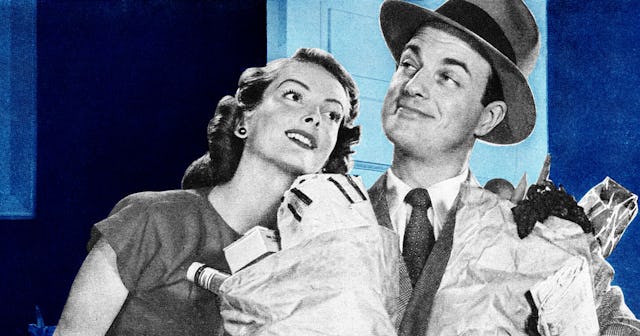My Marriage Doesn't Always Feel 'Equal' But It's Still Fair

I used to believe that an “equal” division of household labor was the key to a healthy marriage. Back then, I envisioned a world where everything was split 50/50. I later learned — the hard way — just how wrong I was.
In those dreams, we’d alternate everything from child-related tasks to who drove the car. There would never be a time when one of us felt used or solely responsible for household tasks. And above all, we’d fill in for each other.
But the way my life played out didn’t align with what I thought an egalitarian relationship was supposed to look like.
I’ve always been told that a good marriage was built on equality. It only made sense that I hold my husband to a standard of reciprocity. So, when my home started to feel less than equal, I was convinced I’d married the wrong person.
But when they said, “marriage is an equal partnership,” they never told us that “equal” didn’t always mean evenly split or the same. It meant that every person gives what they have to contribute to a complete picture.
The concept of an “equal” marriage with “equal” parenting was never met for most of us. But it’s an especially elusive concept for military couples like us. In our case, equal looks like my husband waking up early, sometimes as early as 3 a.m., and not getting back home until ten minutes after I’ve put the kids to bed. On those days, there isn’t time to talk about our days or do much more than give each other a firm hug and a kiss goodnight. At that moment, we’re equally tired and equally overwhelmed, but I’m exhausted from having to deal with the children alone.
Pablo Heimplatz/Unsplash
Some months, “equal” is even more exhausting. It’s him being gone for weeks at a time working 18+ hours shifts with limited opportunities to call home. And it’s me sitting on the bed with my head in my hands crying and almost praying that the children’s tandem naps will last long enough for me to eat for the first time that day and poop for the first time in forever.
I wish I could say I was comforted in our mutual struggle. But I’m not.
Because most times, I’m living my life in pursuit of a pseudo-state of relationship equality. I often seem to forget that no amount of yelling about how tired I am will change the way our lives panned out.
But recently, I’ve learned to give up on my quest for how the world tells me my relationship should function. I’m learning that history includes a wide range of people and circumstances. There are plenty of folks who live “traditionally,” and they have the ability to plan their days and be consistent because they create their future themselves.
But there are others of us who can’t guess what’s happening next because at some point in life we made a decision – whether a personal choice or one of association – to live nontraditionally and embrace the uncertainty of life.
When you’re one of those people who lives nontraditionally, you’re constantly bombarded with images of how others think your life should look. Still, with time, you must assess whether that cookie-cutter image that you’re chasing is a fit for your family dynamic. If not, you’ll drive yourself mad.
So I’m learning to let go of the pre-marriage messages that shaped the way I see my relationship. It’s time I come to terms with the fact that I didn’t pick a partner who has the ability to fit into the traditional concept of an equal partnership.
At the same time, I have to learn to see the effort present in his commitment to smaller things – like coming home and playing with the children as soon as he has the chance to change out of his work clothes. Or reminding me that when he walks in the door, I’m free to get away from the children, whether it’s to meet up with friends or to take a solitary walk.
What really matters isn’t if we meet the definition of “equal,” but that it feels fair to me. We’re working toward an equal commitment to making each other’s lives as simple as possible. We’re equally committed to doing what we can with what we have despite the fact we’re both exhausted and beat down.
My partner won’t change as many diapers as I do. He won’t do as many drop-offs and meetings with our son’s teachers. And he definitely won’t understand the overwhelm that comes with breastfeeding two children on demand for years at a time.
At the same time, there’s a lot about his world I’ll never understand. Unlike him, I don’t have to be prepared to head into work at all hours of the day and feel like I have little control over my life. I live a life where it’s possible to rearrange my schedule and take a couple days off work because one or both of the kids are sick. I have a job that I love, and thankfully I can do much of it from home.
When I look at our respective challenges, things seem a lot more “equal” than I once believed.
I’ve accepted that there will be plenty of times where things don’t fit into my egalitarian fairytale. I understand that there’s no point in getting frustrated about the division of labor when he’s doing what he can to make sure I have plenty of good with some of the bad.
We’re both giving everything we have to our family, even though our methods are different. And that’s equal enough for me.
This article was originally published on